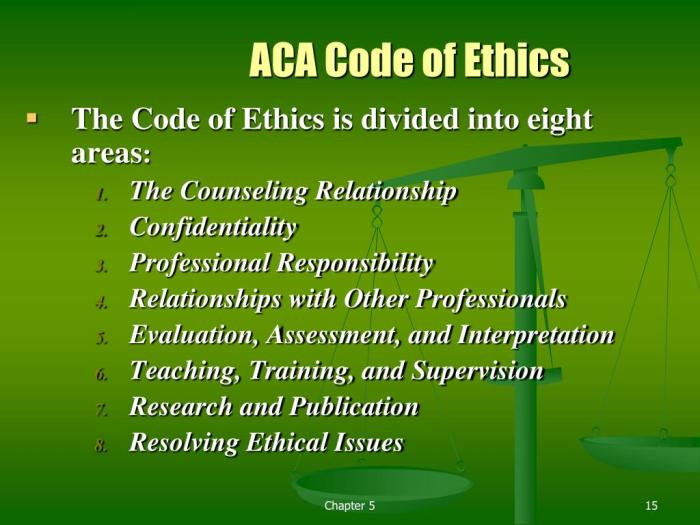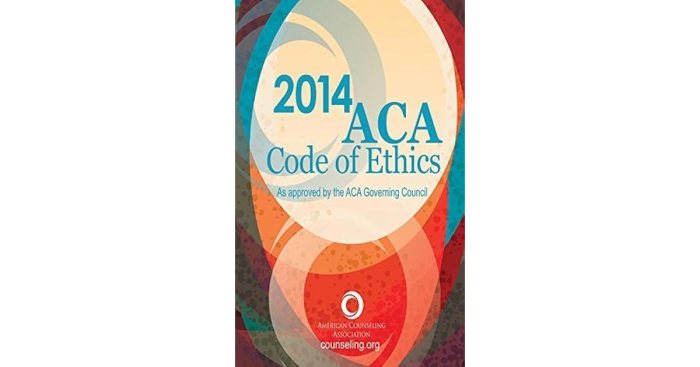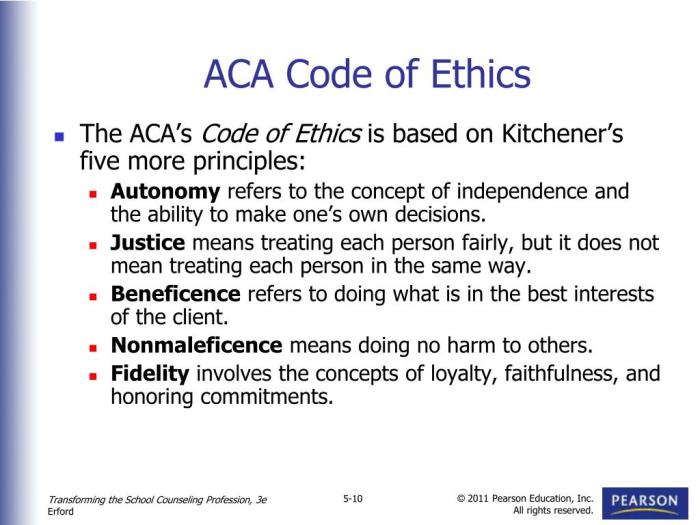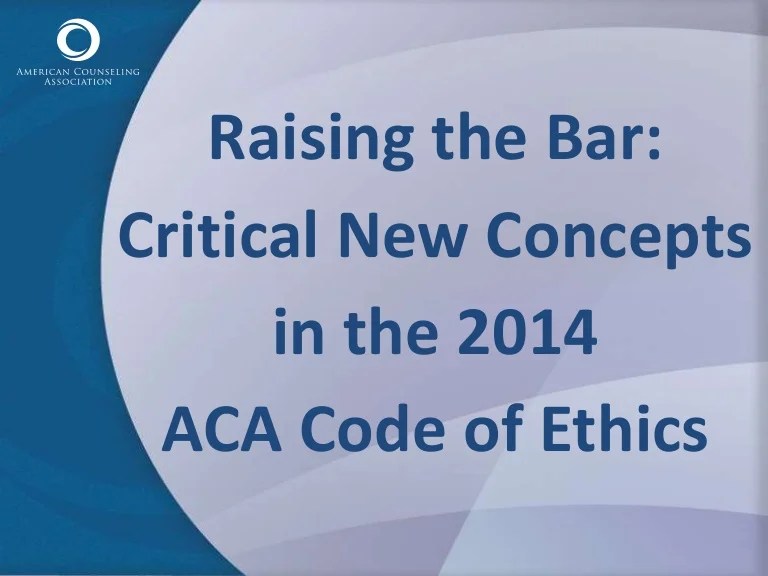The 2014 ACA Code of Ethics is a comprehensive guide that Artikels the ethical principles and responsibilities of counselors. This code provides a framework for ethical decision-making, ensuring that counselors prioritize client welfare, maintain confidentiality, and act with competence within their scope of practice.
Delving deeper into the code, we’ll explore the ethical implications of counselor roles and responsibilities, the importance of ethical decision-making, and the consequences of ethical violations. By understanding and adhering to these ethical guidelines, counselors can foster a safe and supportive environment for their clients, promoting their well-being and personal growth.
Ethical Principles: The 2014 Aca Code Of Ethics

The 2014 ACA Code of Ethics Artikels a set of fundamental ethical principles that guide the conduct of counselors. These principles provide a framework for ethical decision-making and help counselors navigate complex ethical dilemmas.
The core ethical principles include beneficence, non-maleficence, autonomy, justice, and fidelity. Beneficence refers to the obligation to promote the well-being of clients, while non-maleficence emphasizes the importance of avoiding harm. Autonomy respects the client’s right to make informed decisions about their own lives, and justice ensures fair and equitable treatment for all clients.
Fidelity, The 2014 aca code of ethics
Fidelity refers to the counselor’s obligation to honor their commitments and agreements with clients. This includes maintaining confidentiality, respecting boundaries, and acting in the client’s best interests. Counselors must also be honest and transparent in their interactions with clients.
Counselor Roles and Responsibilities
The ACA Code of Ethics Artikels the ethical roles and responsibilities of counselors, emphasizing their duty to maintain the highest standards of professional conduct and practice. Counselors are expected to prioritize client well-being, respect client autonomy, and uphold the integrity of the profession.
Ethical self-disclosure involves counselors sharing personal information with clients when it is relevant to the therapeutic process. This must be done cautiously, ensuring that it benefits the client and does not exploit their vulnerability. Dual relationships, where counselors have multiple roles with clients (e.g.,
therapist and friend), can create ethical conflicts and should be avoided or managed with utmost care.
Ethical Implications of Counselor Self-Disclosure
- Can enhance the therapeutic alliance by fostering trust and rapport.
- Can provide clients with a sense of normalization and hope.
- Must be done judiciously, avoiding oversharing or using it for personal gain.
Ethical Implications of Dual Relationships
- Can compromise objectivity and impartiality.
- Can create power imbalances and exploitation.
- Should be avoided or managed with clear boundaries and informed consent.
Client Welfare and Confidentiality

ACA members are committed to protecting the welfare of their clients and maintaining the confidentiality of client information. These principles are essential to fostering a trusting and ethical therapeutic relationship.
ACA members have an ethical obligation to take reasonable steps to protect clients from harm. This includes providing competent services, maintaining appropriate boundaries, and avoiding dual relationships that could impair objectivity or exploit the client. ACA members must also respect clients’ rights to make their own decisions, even if those decisions are not in the client’s best interests.
The 2014 ACA Code of Ethics is a set of principles that guide the ethical behavior of accountants. The Code addresses a wide range of topics, including confidentiality, independence, and objectivity. If you’re interested in learning more about the difficulty of the CPPB exam, here’s a helpful resource . The Code also provides guidance on how accountants should resolve ethical dilemmas.
Accountants who follow the Code can help to ensure that the public trust in the accounting profession is maintained.
Limits of Confidentiality
Confidentiality is a cornerstone of the therapeutic relationship. ACA members must take all reasonable steps to protect the privacy of client information, including written records, electronic communications, and verbal disclosures. However, there are some exceptions to the rule of confidentiality.
- ACA members may disclose client information if they have a reasonable belief that the client is in imminent danger of harming themselves or others.
- ACA members may disclose client information if they are required to do so by law or court order.
- ACA members may disclose client information if the client has given their written consent.
ACA members should carefully consider the potential risks and benefits of disclosing client information before making a decision. They should also consult with their supervisor or a qualified professional if they are unsure whether an exception to the rule of confidentiality applies.
Competence and Scope of Practice

Maintaining competence as a counselor involves continuous learning and development to provide ethical and effective services. Ethical requirements emphasize the importance of counselors practicing within their scope of practice, recognizing their limitations, and seeking supervision or consultation when necessary.
Continuing education and professional development are crucial for counselors to stay abreast of current research, best practices, and ethical guidelines. This ensures that counselors possess the knowledge and skills to meet the evolving needs of their clients.
Establishing and Maintaining Competence
- Counselors must have the necessary education, training, and experience to provide services within their scope of practice.
- Counselors are responsible for staying informed about new developments in their field through continuing education and professional development.
- Counselors must be aware of their limitations and refer clients to other professionals when appropriate.
Importance of Supervision and Consultation
- Supervision and consultation provide counselors with support, guidance, and accountability in their practice.
- Counselors should seek supervision from qualified professionals to enhance their skills, address ethical dilemmas, and maintain competence.
- Consultation with other professionals can provide valuable insights and perspectives on complex client issues.
Ethical Decision-Making

Ethical decision-making is a complex process that involves considering multiple factors, including the ethical principles of the profession, the client’s welfare, and the counselor’s scope of practice. The ACA Code of Ethics provides a framework for counselors to use when making ethical decisions.
The ethical decision-making process involves the following steps:
- Identify the ethical issue.
- Gather relevant information.
- Consider the ethical principles and values that apply to the situation.
- Identify the potential consequences of each possible action.
- Make a decision and take action.
Counselors may encounter a variety of ethical dilemmas in their practice. For example, a counselor may be faced with a client who is considering suicide. The counselor must decide whether to break confidentiality and inform the client’s family or friends.
Another ethical dilemma that counselors may face is how to deal with a client who is engaging in illegal activities. The counselor must decide whether to report the client’s behavior to the authorities.
The ACA Code of Ethics provides guidance for counselors in making ethical decisions. However, there is no one-size-fits-all approach to ethical decision-making. Counselors must use their best judgment and consider the specific circumstances of each case.
Ethical Violations and Consequences

Ethical violations occur when counselors engage in conduct that violates the Code of Ethics. Reporting such violations is crucial to uphold professional standards and protect clients.
Consequences of unethical conduct can include sanctions from licensing boards, loss of employment, and damage to reputation. Self-reflection and accountability are essential for ethical practice, as counselors must regularly examine their conduct and take responsibility for their actions.
Reporting Ethical Violations
ACA members are obligated to report ethical violations to the appropriate authorities, such as licensing boards or ethics committees. The reporting process typically involves filing a written complaint that provides specific details of the alleged violation.
Self-Reflection and Accountability
Self-reflection is an ongoing process where counselors critically examine their values, beliefs, and behaviors. By regularly reflecting on their practice, counselors can identify potential ethical dilemmas and develop strategies to address them.
Accountability requires counselors to take responsibility for their actions and the consequences of their decisions. They must be willing to acknowledge mistakes and take steps to correct them.
Answers to Common Questions
What are the fundamental ethical principles Artikeld in the 2014 ACA Code of Ethics?
The code emphasizes principles such as beneficence (doing good), nonmaleficence (avoiding harm), autonomy (respecting client self-determination), justice (fair and equitable treatment), and fidelity (keeping promises).
How does the code address counselor self-disclosure and dual relationships?
Counselors must carefully consider the potential impact of self-disclosure on clients and avoid dual relationships that could impair their objectivity or exploit clients.
What are the ethical obligations regarding client confidentiality?
Counselors are ethically bound to maintain client confidentiality, with limited exceptions such as imminent harm to the client or others or legal requirements.